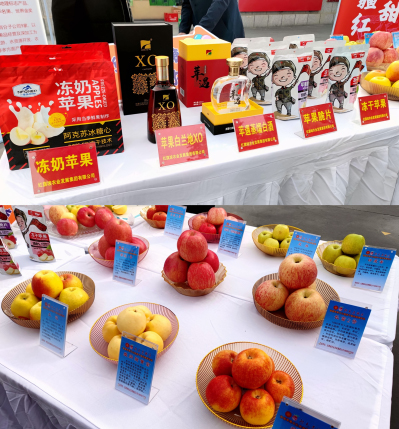The best apples in Xinjiang Uygur Autonomous Region, if not the country, are said to be produced in Aksu Prefecture. Besides being juicy and sweet, the apples produced there are most famous for their “crystal sugar heart,” a translucent core resulting from high sugar content.
“Apples have become a symbol of Aksu, and even Xinjiang,” Patem Eysa, head of the forestry and grassland department of Aksu, said at an October press conference on the development of the local apple industry. She added that the farmers and authorities in the prefecture have been dedicated to constantly improving the quality of its apples by upgrading growing and processing methods, building fruit brands, expanding sales channels and ultimately improving local people’s incomes and lives.
Be fruitful!
Asku is so suitable for growing high-quality apples thanks to its dry, temperate continental climate and long hours of sunshine in all four seasons. Eysa explained that the local water is also a key reason for the apples’ excellent flavor, as the water used for irrigation is the snow and glacier meltwater from the nearby Tianshan Mountains, one of the largest mountain ranges in the world.
Although apples with crystal sugar hearts are delicious, their yield is limited. According to forestry and fruit growing expert Song Wei, of the approximately 44 million tons of apples produced nationwide every year, only about 800,000 tons come from Aksu. “Of these, about 500,000 tons are sold outside Xinjiang, much fewer than from other major production areas,” he told Beijing Review.
“We cannot just pursue high yield; quality is the priority,” Song said, adding that instead of using chemical fertilizers, growers in the area use the more eco-friendly manure and compost, which makes the soil richer, producing better apples.
Apples are the main source of income for Aksu fruit growers, accounting for more than 19 percent of the total output value of the forestry and fruit industry in Xinjiang last year. Growing apples has also been a pillar industry that has facilitated rural populations escaping poverty in the region.
E-commerce has become one of the main channels for selling Aksu’s apples. He Xianguo, Vice President of Fengqing Orchard Cooperative in Aksu, said the cooperative began selling apples via livestreaming six years ago. But at first, owing to a lack of experience and a customer base, it sold only 5 tons, far lower than expected, especially as its orchard is located in one of the best apple-growing locations in Aksu. As time went by and as its reputation grew, sales began to surge—they were able to sell 25 tons of apples in the second year and more than 260 tons last year.
“Constantly improving quality and after-sales service is also an important driver of sales growth,” He said. “We guarantee to compensate buyers if they find any bad apples.”
However, not all consumers buying Aksu apples are getting what they expect. Some unscrupulous traders sell fruit of inferior quality under the label of Aksu apples, but mostly at lower prices.
To address the issue, in 2018, the prefecture’s apple association and online retail giant JD.com introduced regulations that standardize the specific indicators of Aksu apples, such as size, color, picking time and packaging. For example, according to the regulations, all varieties of Aksu apples to be sold on the platform must have no scars, and there must be no deterioration or damage caused by pests.
Also according to the regulations, for the first time, Aksu apples are classified into three levels, with Level One being the highest. The skin of Aksu apples certified as Level One must be 85-90 percent red, and have no defects in appearance or packaging.
“The standard not only protects the interests of consumers, but also those of growers and apple companies that are selling the genuine apples,” said Wang Junbo from Youneng Agricultural Technology Co. Ltd., a subsidiary of Hongqipo Group, a large fruit production and processing company. Youneng is in charge of the group’s apple purchasing, storing, sorting and selling.

Making improvements
Wang said transportation is one of the major challenges facing the industry, due to the distance between Xinjiang and many of China’s major markets. Also, in addition to causing frost damage to the apples, cold weather and heavy snow in winter bring transport to a standstill for days.
As a countermeasure, many apple companies set up warehouses and sorting centers in other parts of Xinjiang that are nearer to inland areas of China.
Additionally apples with tiny scratches or spots are made into apple juice, cider or snacks, which are more stable for transport than fresh fruit. The processed products also have higher added value, and sometimes are more profitable than fresh apples, according to Wang. One of the products introduced recently is freeze-dried apple slices. No additional sugar or any other additives are added as, nowadays, people prefer healthier food choices. “It’s particularly popular among children and seniors,” a sales person of Hongqipo Group said. To cater to more consumers, similar snacks with chocolate coating have also been introduced.
Fruit variety improvement has also been a focus for growers, companies and researchers. A grower in Aksu recently gained fame for developing a kind of apple that will not turn brown shortly after cut.
Guo Yuejin, person in charge of fruit-growing company Jinye Lefeng Agricultural Technology Co. Ltd., said through years of research and other efforts, he has grown apples of improved size and sweetness by watering apple trees with fermented milk every August. “Fermented milk contains protein, which also helps prevent enzymatic darkening [of the fruit after its cut],” he said.
Apple-growing is also being integrated into local tourism development. Every year, a number of regionally distinctive cultural festivals themed around the apple harvest are enjoyed by both locals and visitors. The apple-related activities such as fruit picking and tasting, together with Aksu’s picturesque scenery, distinctive culture and cuisine and hospitable people attracted tourists from the rest of the country to visit or even settle down.
“Quality fruit and meat, not-so-cold weather and the cozy life in general make me and my family not want to go anywhere else,” Li Gang, who comes from Sichuan Province and has lived in Aksu for more than four decades, told Beijing Review. –The Daily Mail-Beijing Review news exchange item






